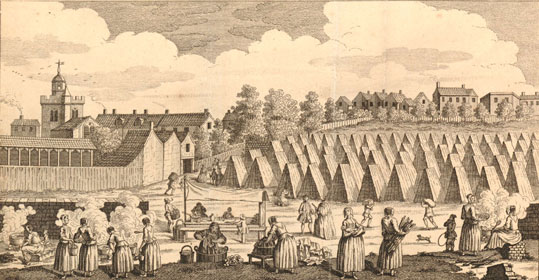Sir,—On showing Fiona Fitzsimons’s article on the Irish Palatines (HI 31.4, July/August 2023, Kindred Lines) to a friend of Palatine descent, the caption of the accompanying image jumped out at me. Was it possible that there was a tented refugee camp in eighteenth-century London that had persisted for over 50 years, as the caption implied? A little digging soon confirmed that it was not so, but the actual story is just as intriguing.

The camp depicted did indeed exist, but it was a temporary thing, lasting for only a few months in 1764. These Palatines were not part of the group that emigrated from the German Palatinate in 1709, ending up in County Limerick. They were instead the protégés of a former Prussian army officer, Col. Johann Heinrich Christian von Stümpel, who convinced several hundred German Protestants of the attractions of a new colony in North America. They sold their possessions and property and transferred the proceeds to von Stümpel to obtain grants of land and arrange their passage to the New World, via London.
However, when they arrived in London in June 1764, von Stümpel had disappeared, along with their money. A contemporary account described their plight, ‘without money, without friends, exposed in the open fields and ready to perish through want. A humane clergyman, who came from the same country, took compassion on them and published their deplorable case in the newspaper.’ Londoners were generous with food, medicine and over a thousand donations amounting to £4,000. The Earl of Sandwich supplied tents from the Tower of London, King George III gave a bounty of £300, and, ‘sensible that his colony of the South Carolina had not its proportion of white inhabitants’, had two ships fitted out to transport them there. The Gentleman’s Magazine of October 1764 reported that ‘the Palatines broke up their camp in White Chapel Fields and embarked onboard the ships to the Carolinas’.
The Palatines were assigned a settlement named Londonborough, in honour of the colonists’ benefactors, though it was sometimes conflated with nearby Scotch-Irish townships of Londonderry or Belfast. But it didn’t prosper and within a generation most of the original settlers had dispersed.
But what of von Stümpel? Among the hundreds of recruiters for colonial schemes at that time there were plenty of unscrupulous ones, including von Stümpel. The aristocratic ‘von’ was a fabrication and the military rank was in effect self-awarded when he offered to organise a militia in his colony.
It seems that he had petitioned the Board of Trade in London for land to settle French and German Protestants in Nova Scotia. Initially a grant of 200,000 acres was considered, but changing political circumstances and doubts about von Stümpel’s ability to fulfil the conditions of the grant meant that he was offered only 20,000 acres. This wasn’t enough to meet the promises he had made to the 400 recruits he had already brought to London, so he did a runner and left them to their own devices.
Warrants for his arrest were quickly issued and he was apprehended in December 1764 in Ansbach, Bavaria. Despite the fact that the Elector of Bavaria had recently decreed the death penalty for fraudulent recruiters, he was apparently released without punishment, and there is no evidence of a subsequent trial or sanction.—Yours etc.,
SEÁN BOYLE
London
Thank you for pointing out the error. And what an interesting story!—Ed.
